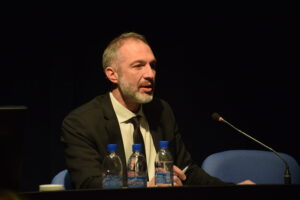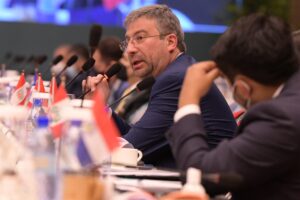During elections in Latin America, disinformation and the use of social media as a channel of political propaganda have become cause for concern not only for the media, but also for national voting authorities and civil society organizations that form collaborative initiatives for monitoring and fact checking the news.
During Argentina's primary elections in August 2023, Javier Milei, one of the three main presidential candidates, came out of the polls surrounded by journalists and people asking for selfies. After posing for photos, he took to social networks to post complaints of alleged electoral fraud against his party La Libertad Avanza.
"Without fraud, I would have gotten 35 points," the candidate blasted in his social media channels. Before the media, he said that 5% of votes had been stolen from him and so that the 30% he had obtained as a final result was not accurate.
This episode of disinformation, carried out by a political figure, caused a public uproar and concern from the authorities of the National Electoral Chamber of the Judiciary in Argentina, who had to issue a statement saying that no complaints had been filed with the Electoral Court regarding electoral fraud.

Hernán Goncalves Figueiredo, Camara Electoral de Argentina. (Photo / CELE-Universidad de Palermo, Argentina)
"In addition to responding legally to the candidate, the National Chamber asked for collaboration from all politicians because if they misinform through viralization in social media, it causes immense damage to the electoral system," Hernán Gonçalves Figueiredo, electoral justice specialist, told LatAm Journalism Review (LJR).
According to Daniel Mazzone, a researcher of media digital platforms, these news disturbances divert attention from the real agenda and problems to be addressed by society. One way to counteract it is through strategies for monitoring and news fact-checking that have raised a new scenario of action: collaborative agreements and dialogue between federal bodies, such as the National Electoral Chamber of Argentina, and news agencies and digital platforms to combat false news.
"The Chamber signed an agreement with news agency Agence France Presse. The protocol is activated by means of quick responses the agency requests from us in the event of having to check a news item or needing official information," Figueiredo said.
In recent years, other Latin American countries have experienced incidents of disinformation from political figures on social media and in local press that have threatened the credibility of voting authorities and democratic systems.
In the case of Peru, the National Office of Electoral Processes (ONPE, for its Spanish acronym), was also threatened in the 2021 presidential elections. There were accusations of fraud in the first and second voting rounds, which destabilized the system and public opinion.
According to Renzo Mizzei, manager of the Electoral Information and Education area of ONPE, there is a clear reason this is becoming more frequent.
"In Latin America, our electoral processes are increasingly close, with little difference of points in the results. Then, candidates go looking for reasons to justify their defeat and that affects credibility," Mizzei said to LJR.
Undoubtedly, technological development and the use of social media allow the electoral process to become closer and more immediate between voters and candidates. But when this intersects with disinformation, this triggers a high-risk alert.
"The roots of the use of social media as a form of political propaganda go back to the presidential elections of Barack Obama in 2008. He was one of the first politicians to discover the usefulness of social media as a tool to connect more closely with his voters," said Mexican Magistrate Martha Ramírez in Foro Jurídico.
From that moment on, some politicians around the world began to share not only proposals, but also unverified information.
Civil society organizations also make up the roster of entities that safeguard the democratic system. In Argentina, Poder Ciudadano, a foundation concerned with civic rights, recently produced and published – with UNESCO’s support – a Practical Guide on Electoral Disinformation for organizations and electoral bodies in Latin America.
Karina Kalpschtrej, Poder Ciudadano's deputy director in Argentina, told LJR that "today, disinformation is one more player in the electoral contest."
According to some experts, the speed with which messages are disseminated, coupled with the transparency required by the electoral process are factors that require the interaction of organized civil society, the State and media to promote the veracity of information.
On the other hand, digital platforms bring another challenge linked to disinformation that, according to Kalpschtrej, "are the processes of labeling, [and] segmentation, which make it possible for messages to circulate more widely and more intensely.”
At the XV Conference of the Inter-American Union of Electoral Organizations (UNIORE) in 2021, a concern for the electoral systems of the region gave rise to a regional project: the creation of an Inter-American Observatory for Combating Electoral Disinformation. Its purpose is to activate cooperation between communication directorates of electoral bodies and fact-checking organizations and social media platforms, as well as to be an outlet for sharing news fact-checking experiences.

Piero Corvetto Salinas, proponent of the Interamerican Observatory for Combating Electoral Disinformation. (Photo / ONPE)
"The agreements that were established at the regional level will include research content that we’ll share and that affect all our countries," Mazzei, from the ONPE, said.
The regional observatory that is being developed came from the 2021 Peruvian elections of 2021, in which there were more than 150 responses to situations of disinformation linked to the electoral process.
"On that occasion, records were shown on social media of fake people who were supposedly deceased and allegedly voted. The ONPE national office had to come out and deny this false information immediately through social media," Mazzei said.
The upcoming elections in Argentina will be an inaugural test for the Inter-American Observatory, which will support the National Electoral Chamber in the detection of false news. One of the activities will consist of organizing webinars that will bring together authorities from Argentina, regional authorities and journalists that work in fact-checking. This regional effort is giving a boost to a campaign against disinformation and to preserve democracies in the region.
--
Contributor Soledad Dominguez is a journalist covering and writing stories on human rights, racial equality and innovation in journalism in Argentina and Brazil.